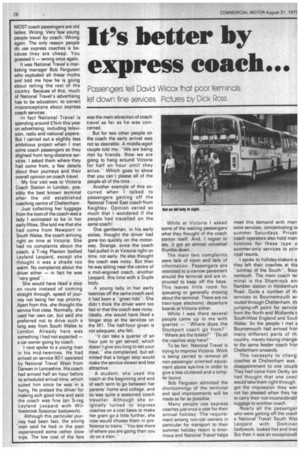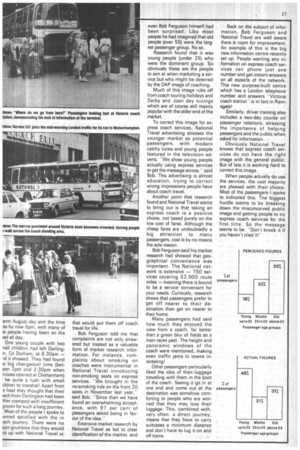It's better by express coach...
Page 28

Page 29

If you've noticed an error in this article please click here to report it so we can fix it.
Passengers tell David Wilcox that poor terminals let down fine services. Pictures by Dick Ross,
MOST coach passengers are old ladies. Wrong. Very few young people travel by coach. Wrong again. The only reason people do use express coaches is be cause they are cheap. You guessed it — wrong once again. It was National Travel's marketing manager Bob Ferguson who exploded all these myths and told me how he is going about telling the rest of the country. Because of this, much of National Travel's advertising has to be education; to correct misconceptions about express coach services.
In fact National Travel is spending around £1/4m this year on advertising, including television, radio and national papers. But I carried out a slightly less ambitious project when I met some coach passengers as they alighted from long-distance services. I asked them where they had come from, a few details about their journeys and their overall opinion on coach travel.
My first visit was to Victoria Coach Station in London, possibly the best known terminal after the old established coaching centre of Cheltenham.
Just collecting her luggage from the boot of the coach was a lady I estimated to be in her early fifties. She told me that she had come from Newport in South Wales, the coach arriving right on time at Victoria. She had no complaints about the coach, a T-reg Plaxton bodied Leyland Leopard, except she thought it was a shade too warm. No complaints about the driver either — in fact he was "very good' ".
She would have liked a stop en route instead of coming straight through, speed of journey not being her top priority. Apart from this, she thought the service first class. Normally, she used her own car, but said she preferred not to drive such a long way from South Wales to London. Already here was something I had not expected — a car owner going by coach.
I next spoke to a young man in his mid-twenties. He had arrived on service 901 operated by National Travel West from Darwen in Lancashire. His coach had arrived half an hour before its scheduled arrival time, which suited him since he was in a hurry. He praised the driver for making sich good time and said the coach was fine (an S-reg Leyland Leopard with Willowbrook Spacecar bodywork).
Although this particular jour, ney had been fast, the young man said he had in the past experienced some rather slow trips. The low cost of the fare was the main attraction of coach travel as far as he was concerned.
But for two other people on the coach the early arrival was not so desirable. A middle-aged couple told me: "We are being met by friends. Now we are going to hang around Victoria for half an hour until they arrive.Which goes to show that you can't please all of the people all of the time .. . .
Another example of this occurred when I talked to passengers getting off the National Travel East coachlrom Keighley. Opinion varied so much that I wondered if the people had travelled on the same coach!
One gentleman, in his early sixties, thought the driver had gone too quickly on the motorway. Strange, since the coach had pulled in at Victoria right on time, not early. He also thought the coach was noisy. But then he was sitting near the centre of a mid-engined coach, another Leopard, this time with a Duple body.
A young lady in her early twenties off the same coach said it had been a "'great ride". She didn't think the driver went too fast or that the coach was noisy Ideally, she would have liked a longer stop at the services on the Ml. The half-hour given is not adequate, she felt.
-It can take a quarter of an hour just to get served, which doesn't give you long to eat your meal," she complained, but admitted that a longer stop would make the service slower and less attractive.
A student, she used the coach at the beginning and end of each term to go between her parents' home and college, and so was quite a seasoned coach traveller. Although she originally turned to express coaches on a cost basis to make her grant go a little further, she now would choose them in preference to trains. "You see more of where you are going than you do on a train. While at Victoria I asked some of the waiting passengers what they thought of the coach station itself. And, I regret to say, it got an almost universal thumbs-down.
The main two complaints were lack of room and lack of information. Passengers are restricted to a narrow pavement around the terminal and are instructed to keep off the bays. This leaves little room for queueing or generally moving about the terminal. There are no train-type electronic departure boards at Victoria either.
While I was there several people came up to me with queries — "Where does the Stockport coach go from?" "Where are the toilets?" "Do all the coaches stop here?"
To be fair, National Travel is trying to improve Victoria. Work is being carried to remove all non-passenger oriented equipment above eye-line in order to give a less cluttered and .a simpler layout.
Bob Ferguson admitted the shortcomings of the terminal and said improvements will be made as far as possible.
Many people use express coaches just once a year for their annual holiday. The requirement among non-car owners in particular for transport to their summer holiday resort is enormous and National Travel helps
meet this demand with man, extra services, concentrating or summer Saturdays. Privati coach operators also hold man, licences for these type o summer-only services to prin cipal resorts.
I spoke to holiday-makers a they left their coaches at tha "suntrap of the South", Bour nemouth. The main coach ter minal is the Shamrock an Rambler station in Holdenhurs Road. Quite a number of thi services to Bournemouth an routed through Cheltenham, thi jumping-off point for service from the North and Midlands t( South-West England and Soutl Wales. So the people I met a Bournemouth had arrived fron many different parts of th, country, merely having change( to the same feeder coach fron Cheltenham onwards.
This necessity to chang, coaches at Cheltenham was disappointment to one couple They had come from Derby an( had thought that one coacl would take them right through. got the impression they wer not too pleased when they ha' to carry their not-inconsiderabl luggage to another coach Nearly all the passenger who were getting off the coach a National Travel South Wes Leopard with Dominan bodywork, looked hot and tired But then it was an exceptionall 'arm August day and the time as by now 6pm, with many of le people having been on the iad all day.
One young couple with two nail children had left Darling Co Durham, at 8.30am — id it showed. They had found ie big changeover time (beteen 2pm and 2.30pm when irvices connect at Cheltenham) be quite a rush with small iildren to marshal! Apart from e heat they thought that their iach from Darlington had been ther cramped with insufficient jroom for such a long journey. Most of the people I spoke to emeci satisfied with the in ach journey. There were no ajor grumbles that they would Bob Ferguson told me that complaints are not only answered but treated as a valuable form of market research information. For instance, complaints about smoking on coaches were instrumental in National Travel introducing non-smoking seats on express services. "We brought in the no-smoking rule on the front 20 seats in November last year,' said Bob. "Since then we have found an overwhelming acceptance, with 97 per cent of passengers asked being in favour of the idea." Extensive market research by National Travel as led to clear identification of the market, and even Bob Ferguson himself had been surprised. Like most people he had imagined that old people (over 55) were the largest passenger group. No so. Research found that it was young people (under 25) who were the dominant group. So obviously these are the people to aim at when marketing a service but who might be deterred by the OAP image of coaching. Much of this image rubs off from coach touring holidays and Darby and Joan day outings which are of course still mainly popular with the older end of the market. To correct this image for express coach services, National Travel advertising stresses the younger market as potential passengers, with modern catchy tunes and young people featured in the television adverts. "We show young people actually using express services to get the message across said Bob. This advertising is almost education, trying to correct wrong impressions people have about coach travel. Another point that research found and National Travel wants to bring out is that taking an express coach is a positive choice, not based purely on the low cost of fares. Although the cheap fares are undoubtedly a big attraction to many passengers, cost is by no means the sole reason. Bob Ferguson said his market research had showed that geographical convenience was important. The National network is extensive — 750 services covering 52,000 route miles — meaning there is bound to be a service convenient for your needs. Curiously, research shows that passengers prefer to get off nearer to their destination than get on nearer to their home. Many passengers had said how much they enjoyed the view from a coach, far better than a green blur of fields as a train races past. The height and panoramic windows of the coach were mentioned, Making even traffic jams in towns interesting! Other passengers particularly liked the idea of their‘ luggage travelling with them in the boot of the coach. Seeing it go in at one end and come out at the destination was somehow com forting to people who are worried that they may lose their luggage. This, combined with, very often, a direct journey., means that they have to carry suitcases a minimum distance and don't have to lug it on and off trains. Back on the subject of information, Bob Ferguson and National Travel are well aware there is room for improvement. An example of this is the big new information centre recently set up. People wanting any information on express coach services can phone just one number and get instant answers on all aspects of the network. This new purpose-built centre which has a London telephone number and answers "Victoria coach station" is in fact in Ramsgate! Similarly, driver training also includes a two-day course on passenger relations, stressing the importance of helping passengers and the public when asked for information. Obviously National Travel knows that express coach services do not have the right image with the general public. But of late it is working hard to correct this image. When people actually do use the services, the vast majority are pleased with their choice. Most of the passengers I spoke to indicated this. The biggest hurdle seems to be breaking down the misconceived public image and getting people to try express coach services for the first time. So the message seems to be: "Don't knock it if you haven't tried it!'




































































































